北京大学翻译硕士考研真题真题解析真题答案考研资料
- 格式:pdf
- 大小:214.54 KB
- 文档页数:10
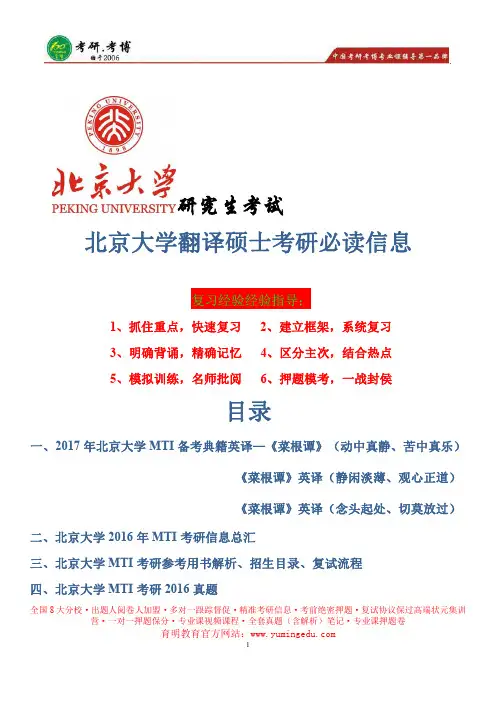
研究生考试北京大学翻译硕士考研必读信息复习经验经验指导:1、抓住重点,快速复习2、建立框架,系统复习3、明确背诵,精确记忆4、区分主次,结合热点5、模拟训练,名师批阅6、押题模考,一战封侯目录一、2017年北京大学MTI备考典籍英译—《菜根谭》(动中真静、苦中真乐)《菜根谭》英译(静闲淡薄、观心正道)《菜根谭》英译(念头起处、切莫放过)二、北京大学2016年MTI考研信息总汇三、北京大学MTI考研参考用书解析、招生目录、复试流程四、北京大学MTI考研2016真题全国8大分校·出题人阅卷人加盟·多对一跟踪督促·精准考研信息·考前绝密押题·复试协议保过高端状元集训营·一对一押题保分·专业课视频课程·全套真题(含解析)笔记·专业课押题卷育明教育官方网站:五、育明教育成功学员展示(另附学习方法、育明内部参考用书)六、2017年北京大学MTI备考百科知识——中国文学2017年北京大学MTI备考典籍—《菜根谭》英译(动中真静、苦中真乐)《菜根谭》英译(静闲淡薄、观心正道)《菜根谭》英译(念头起处、切莫放过)《菜根谭》英译(动中真静、苦中真乐)静中静非真静,动处静得来,才是性天之真境;乐处乐非真乐,苦中乐得来,才是心体之真机。
If you are able to keep quiet in a noiseless place,that kind of quietness does not count for much;only the quietness that is obtained from hard work accords completely with man’s nature.If you are able to keep happy on a joyous occasion,that is not happiness in the real sense;only the happiness gained in misery is the source of vitality for man’s body and soul.(保罗·怀特译)The genuine tranquility is not that attained amidst quietude but that attained amidst noisy conditions,which counts as the realm of man’s natural characters.The real delight is not that sought on joyous occasions but that sough under adverse circumstances,which counts as the true subtlety of man’s hearted feelings.(周文标译)The peace of mind in peaceful surroundings is no real peace of mind;the peace of mind acquired in disturbing circumstances only is the ultimate condition of one’s nature.The joy on joyful occasions is no real joy;the joy obtained in sorrowful situations alone is the ultimate delight of one’s instinct.(蒋坚松译)全国8大分校·出题人阅卷人加盟·多对一跟踪督促·精准考研信息·考前绝密押题·复试协议保过高端状元集训营·一对一押题保分·专业课视频课程·全套真题(含解析)笔记·专业课押题卷育明教育官方网站:《菜根谭》英译(静闲淡薄、观心正道)静中念虑澄澈,见心之真体;闲中气象从容,识心之真机;淡中意趣冲夷,得心之真味。
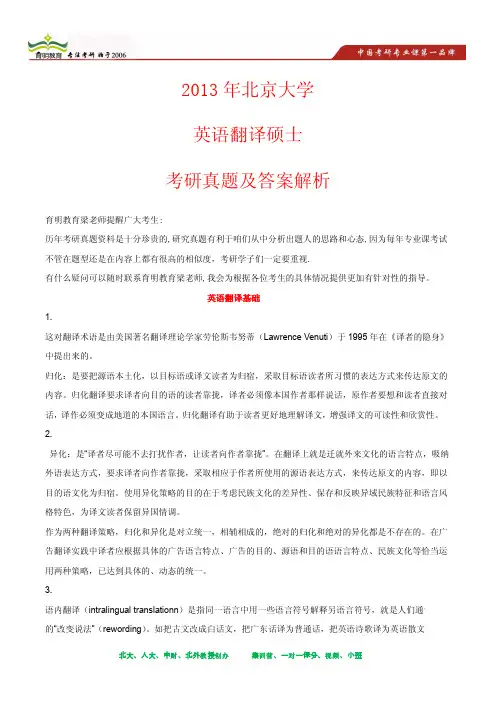
财教创办北大、人大、中、北外授 训营对视频集、一一保分、、小班2013年北京大学英语翻译硕士考研真题及答案解析育明教育梁老师提醒广大考生:历年考研真题资料是十分珍贵的,研究真题有利于咱们从中分析出题人的思路和心态,因为每年专业课考试不管在题型还是在内容上都有很高的相似度,考研学子们一定要重视.有什么疑问可以随时联系育明教育梁老师,我会为根据各位考生的具体情况提供更加有针对性的指导。
英语翻译基础1.这对翻译术语是由美国著名翻译理论学家劳伦斯韦努蒂(Lawrence Venuti )于1995年在《译者的隐身》中提出来的。
归化:是要把源语本土化,以目标语或译文读者为归宿,采取目标语读者所习惯的表达方式来传达原文的内容。
归化翻译要求译者向目的语的读者靠拢,译者必须像本国作者那样说话,原作者要想和读者直接对话,译作必须变成地道的本国语言。
归化翻译有助于读者更好地理解译文,增强译文的可读性和欣赏性。
2.异化:是“译者尽可能不去打扰作者,让读者向作者靠拢”。
在翻译上就是迁就外来文化的语言特点,吸纳外语表达方式,要求译者向作者靠拢,采取相应于作者所使用的源语表达方式,来传达原文的内容,即以目的语文化为归宿。
使用异化策略的目的在于考虑民族文化的差异性、保存和反映异域民族特征和语言风格特色,为译文读者保留异国情调。
作为两种翻译策略,归化和异化是对立统一,相辅相成的,绝对的归化和绝对的异化都是不存在的。
在广告翻译实践中译者应根据具体的广告语言特点、广告的目的、源语和目的语语言特点、民族文化等恰当运用两种策略,已达到具体的、动态的统一。
3.语内翻译(intralingual translationn 的“改变说法”(rewording )。
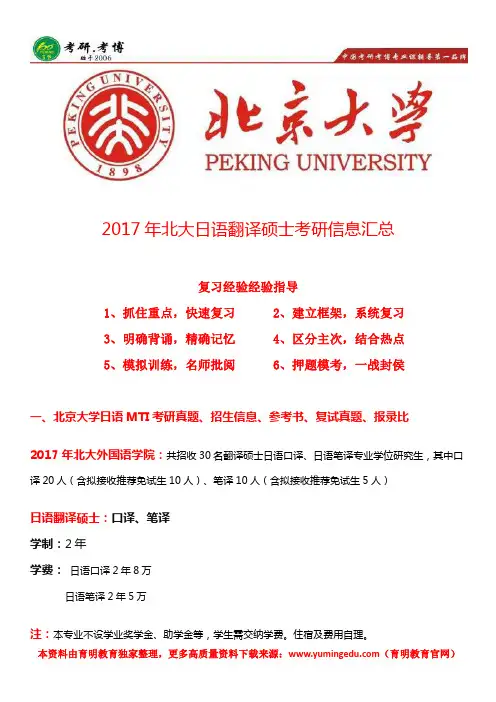
2017年北大日语翻译硕士考研信息汇总复习经验经验指导1、抓住重点,快速复习2、建立框架,系统复习3、明确背诵,精确记忆4、区分主次,结合热点5、模拟训练,名师批阅6、押题模考,一战封侯一、北京大学日语MTI考研真题、招生信息、参考书、复试真题、报录比2017年北大外国语学院:共招收30名翻译硕士日语口译、日语笔译专业学位研究生,其中口译20人(含拟接收推荐免试生10人)、笔译10人(含拟接收推荐免试生5人)日语翻译硕士:口译、笔译学制:2年学费:日语口译2年8万日语笔译2年5万注:本专业不设学业奖学金、助学金等,学生需交纳学费。
住宿及费用自理。
1.考试科目1、思想政治理论2、翻译硕士日语3、日语翻译基础4、汉语写作与百科知识★★★育明教育宋宋解析北大日语翻硕:北京大学的日语MTI分为日语口译和日语笔译,初试考的是同一张试卷,除了思想政治理论是全国统一试卷,剩下三门专业课都是北大自主出题,出题的方向整体都偏文学性,特别指出的是,北大英语MTI和日语的MTI的专业课汉语写作与百科知识,考的是同一张试卷,分为基础知识(100分)和专业知识(50分)两部分,满分150分。
2.北大日语MTI分数线:2016年日语笔译:思想政治理论50外语55专业一90专业二90总分330日语口译:思想政治理论50外语55专业一90专业二90总分3202015年日语笔译、日语口译:思想政治理论50外语60专业一90专业二90总分370分2014年日语笔译、日语口译:思想政治理论50外语50专业一90专业二90总分325分★★★★★育明教育宋宋老师解析:北大是自主划线的学校之一,她可以根据学校当年的招生人数、学生报考人数和考生的整体的考试水平自己划定分数线,从14年到16年这三年的分数线可以看出,北大的平均分数线整体在320到350分左右,2015年是比较特殊的一年口译和笔译的分数线达到370分之多,16年分数慢慢恢复正常,有北大情结的考生呢,不要被分数线吓到,要平稳心态,分数线高一是当年生源比较多,二来当年的题型相对简单。
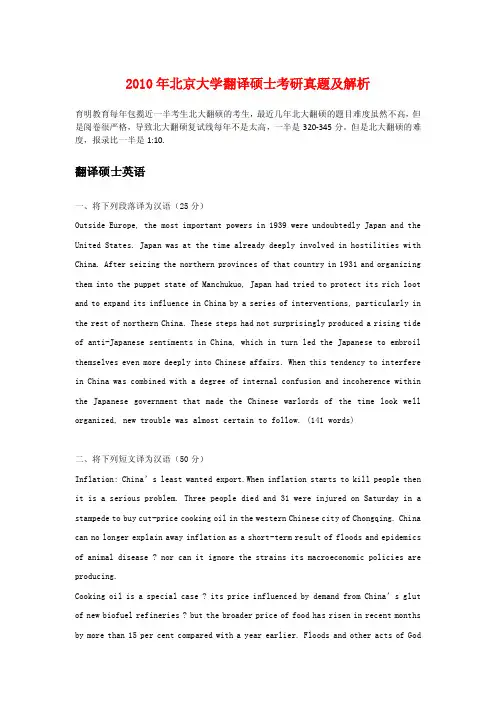
2010年北京大学翻译硕士考研真题及解析育明教育每年包揽近一半考生北大翻硕的考生,最近几年北大翻硕的题目难度虽然不高,但是阅卷很严格,导致北大翻硕复试线每年不是太高,一半是320-345分。
但是北大翻硕的难度,报录比一半是1:10.翻译硕士英语一、将下列段落译为汉语(25分)Outside Europe, the most important powers in 1939 were undoubtedly Japan and the United States. Japan was at the time already deeply involved in hostilities with China. After seizing the northern provinces of that country in 1931 and organizing them into the puppet state of Manchukuo, Japan had tried to protect its rich loot and to expand its influence in China by a series of interventions, particularly in the rest of northern China. These steps had not surprisingly produced a rising tide of anti-Japanese sentiments in China, which in turn led the Japanese to embroil themselves even more deeply into Chinese affairs. When this tendency to interfere in China was combined with a degree of internal confusion and incoherence within the Japanese government that made the Chinese warlords of the time look well organized, new trouble was almost certain to follow. (141 words)二、将下列短文译为汉语(50分)Inflation: China’s least wanted export.When inflation starts to kill people then it is a serious problem. Three people died and 31 were injured on Saturday in a stampede to buy cut-price cooking oil in the western Chinese city of Chongqing. China can no longer explain away inflation as a short-term result of floods and epidemics of animal disease ? nor can it ignore the strains its macroeconomic policies are producing.Cooking oil is a special case ? its price influenced by demand from China’s glut of new biofuel refineries ? but the broader price of food has risen in recent months by more than 15 per cent compared with a year earlier. Floods and other acts of God。
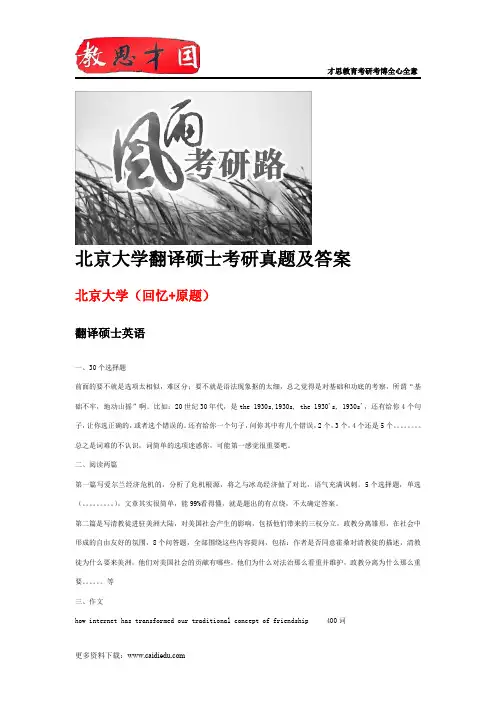
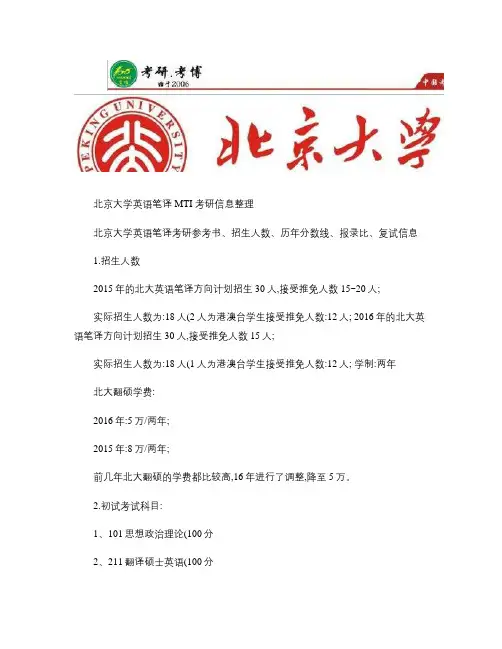
北京大学英语笔译 MTI 考研信息整理北京大学英语笔译考研参考书、招生人数、历年分数线、报录比、复试信息1.招生人数2015年的北大英语笔译方向计划招生 30人,接受推免人数 15~20人;实际招生人数为:18人(2人为港澳台学生接受推免人数:12人; 2016年的北大英语笔译方向计划招生 30人,接受推免人数 15人;实际招生人数为:18人(1人为港澳台学生接受推免人数:12人; 学制:两年北大翻硕学费:2016年:5万/两年;2015年:8万/两年;前几年北大翻硕的学费都比较高,16年进行了调整,降至 5万。
2.初试考试科目:1、101思想政治理论(100分2、211翻译硕士英语(100分3、357英语翻译基础(150分4、448汉语写作与百科知识(150分★★★育明宋老师解析:北大英语 MTI 只有笔译一个方向,初试除了思想政治理论是全国统一试卷, 剩下的三门专业课, 都是北大自主出题, 出题的整体方向都偏文学性, 特别指出的是, 北大英语 MTI 和日语的 MTI 的专业课汉语写作与百科知识,考的是同一张试卷,分为基础知识(100分和专业知识(50分两部分,满分 150分.北大考研(翻译技巧——形容词的翻译形容词与比较级形容词的第三大难点即形容词比较级的翻译,说到这里,很多小伙伴不以为然,不就是“比…更…” 吗,但是,你要相信考试的时候是不会出“this stick is longer than that one”这类弱智句子的, 下面我们一起来缕缕这些时常困扰着我们的比较级~1, “比较级+than”结构,这类句式比较常见,在翻译时,要先翻译 than 后面的内容,如:①Marseilles has proved to be a better racial melting pot than Lyons.事实证明,与里昂相比,马赛是一个更好的种族大熔炉。
②She’s much happier performing live than in a recording studio.与在录音棚里录音相比,她更喜欢现场表演。
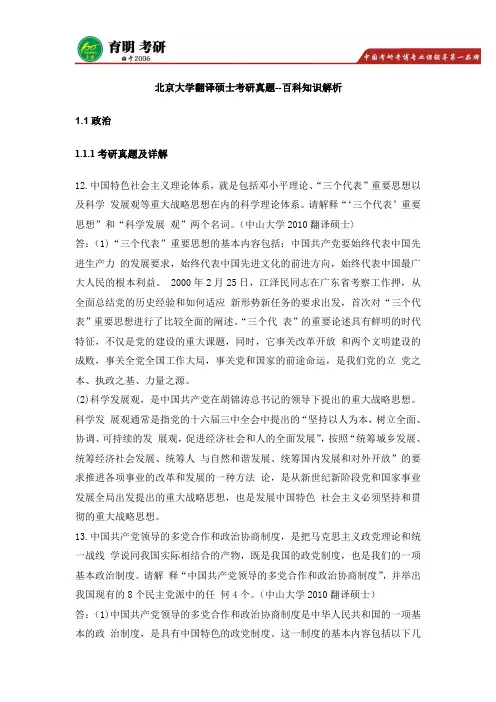
北京大学翻译硕士考研真题--百科知识解析1.1政治1.1.1考研真题及详解12.中国特色社会主义理论体系,就是包括邓小平理论、“三个代表”重要思想以及科学发展观等重大战略思想在内的科学理论体系。
请解释“‘三个代表’重要思想”和“科学发展观”两个名词。
(中山大学2010翻译硕士〉答:(1)“三个代表”重要思想的基本内容包括:中国共产党要始终代表中国先进生产力的发展要求,始终代表中国先进文化的前进方向,始终代表中国最广大人民的根本利益。
2000年2月25日,江泽民同志在广东省考察工作押,从全面总结党的历史经验和如何适应新形势新任务的要求出发,首次对“三个代表”重要思想进行了比较全面的阐述。
“三个代表”的重要论述具有鲜明的时代特征,不仅是党的建设的重大课题,同时,它事关改革开放和两个文明建设的成败,事关全党全国工作大局,事关党和国家的前途命运,是我们党的立党之本、执政之基、力量之源。
(2)科学发展观,是中国共产党在胡锦涛总书记的领导下提出的重大战略思想。
科学发展观通常是指党的十六届三中全会中提出的“坚持以人为本,树立全面、协调、可持续的发展观,促进经济社会和人的全面发展”,按照“统筹城乡发展、统筹经济社会发展、统筹人与自然和谐发展、统筹国内发展和对外开放”的要求推进各项事业的改革和发展的一种方法论,是从新世纪新阶段党和国家事业发展全局出发提出的重大战略思想,也是发展中国特色社会主义必须坚持和贯彻的重大战略思想。
13.中国共产党领导的多党合作和政治协商制度,是把马克思主义政党理论和统一战线学说同我国实际相结合的产物,既是我国的政党制度,也是我们的一项基本政治制度。
请解释“中国共产党领导的多党合作和政治协商制度”,并举出我国现有的8个民主党派中的任何4个。
(中山大学2010翻译硕士)答:(1)中国共产党领导的多党合作和政治协商制度是中华人民共和国的一项基本的政治制度,是具有中国特色的政党制度。
这一制度的基本内容包括以下几个方面。
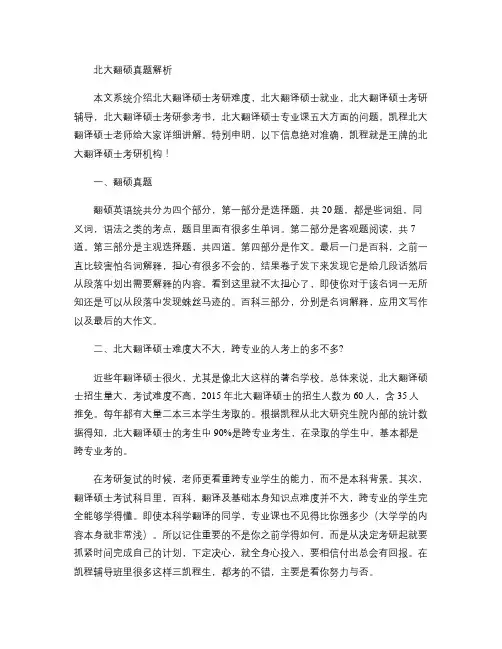
北大翻硕真题解析本文系统介绍北大翻译硕士考研难度,北大翻译硕士就业,北大翻译硕士考研辅导,北大翻译硕士考研参考书,北大翻译硕士专业课五大方面的问题,凯程北大翻译硕士老师给大家详细讲解。
特别申明,以下信息绝对准确,凯程就是王牌的北大翻译硕士考研机构!一、翻硕真题翻硕英语统共分为四个部分,第一部分是选择题,共20题,都是些词组,同义词,语法之类的考点,题目里面有很多生单词。
第二部分是客观题阅读,共7道。
第三部分是主观选择题,共四道。
第四部分是作文。
最后一门是百科,之前一直比较害怕名词解释,担心有很多不会的,结果卷子发下来发现它是给几段话然后从段落中划出需要解释的内容。
看到这里就不太担心了,即使你对于该名词一无所知还是可以从段落中发现蛛丝马迹的。
百科三部分,分别是名词解释,应用文写作以及最后的大作文。
二、北大翻译硕士难度大不大,跨专业的人考上的多不多?近些年翻译硕士很火,尤其是像北大这样的著名学校。
总体来说,北大翻译硕士招生量大,考试难度不高,2015年北大翻译硕士的招生人数为60人,含35人推免。
每年都有大量二本三本学生考取的。
根据凯程从北大研究生院内部的统计数据得知,北大翻译硕士的考生中90%是跨专业考生,在录取的学生中,基本都是跨专业考的。
在考研复试的时候,老师更看重跨专业学生的能力,而不是本科背景。
其次,翻译硕士考试科目里,百科,翻译及基础本身知识点难度并不大,跨专业的学生完全能够学得懂。
即使本科学翻译的同学,专业课也不见得比你强多少(大学学的内容本身就非常浅)。
所以记住重要的不是你之前学得如何,而是从决定考研起就要抓紧时间完成自己的计划,下定决心,就全身心投入,要相信付出总会有回报。
在凯程辅导班里很多这样三凯程生,都考的不错,主要是看你努力与否。
三、北大翻译硕士就业怎么样?现在国内紧缺的专业翻译人才五大方向为会议口译(广泛应用于外交外事、会晤谈判、商务活动、新闻传媒、培训授课、电视广播、国际仲裁等领域),法庭口译(目前国内这一领域的高级口译人才几乎是空白),商务口译,联络陪同口译(企业、政府机构都有大量的外事接待事务,联络陪同口译的任务就是在接待、旅游等事务中担任口译工作),文书翻译(企业、出版社、翻译公司等机构都需要具备专业素养的文本翻译人才,这一领域的人才缺口更大)。

北大翻硕真题解析本文系统介绍北大翻译硕士考研难度,北大翻译硕士就业,北大翻译硕士考研辅导,北大翻译硕士考研参考书,北大翻译硕士专业课五大方面的问题,凯程北大翻译硕士老师给大家详细讲解。
特别申明,以下信息绝对准确,凯程就是王牌的北大翻译硕士考研机构!一、翻硕真题翻硕英语统共分为四个部分,第一部分是选择题,共20题,都是些词组,同义词,语法之类的考点,题目里面有很多生单词。
第二部分是客观题阅读,共7道。
第三部分是主观选择题,共四道。
第四部分是作文。
最后一门是百科,之前一直比较害怕名词解释,担心有很多不会的,结果卷子发下来发现它是给几段话然后从段落中划出需要解释的内容。
看到这里就不太担心了,即使你对于该名词一无所知还是可以从段落中发现蛛丝马迹的。
百科三部分,分别是名词解释,应用文写作以及最后的大作文。
二、北大翻译硕士难度大不大,跨专业的人考上的多不多?近些年翻译硕士很火,尤其是像北大这样的著名学校。
总体来说,北大翻译硕士招生量大,考试难度不高,2015年北大翻译硕士的招生人数为60人,含35人推免。
每年都有大量二本三本学生考取的。
根据凯程从北大研究生院内部的统计数据得知,北大翻译硕士的考生中90%是跨专业考生,在录取的学生中,基本都是跨专业考的。
在考研复试的时候,老师更看重跨专业学生的能力,而不是本科背景。
其次,翻译硕士考试科目里,百科,翻译及基础本身知识点难度并不大,跨专业的学生完全能够学得懂。
即使本科学翻译的同学,专业课也不见得比你强多少(大学学的内容本身就非常浅)。
所以记住重要的不是你之前学得如何,而是从决定考研起就要抓紧时间完成自己的计划,下定决心,就全身心投入,要相信付出总会有回报。
在凯程辅导班里很多这样三凯程生,都考的不错,主要是看你努力与否。
三、北大翻译硕士就业怎么样?现在国内紧缺的专业翻译人才五大方向为会议口译(广泛应用于外交外事、会晤谈判、商务活动、新闻传媒、培训授课、电视广播、国际仲裁等领域),法庭口译(目前国内这一领域的高级口译人才几乎是空白),商务口译,联络陪同口译(企业、政府机构都有大量的外事接待事务,联络陪同口译的任务就是在接待、旅游等事务中担任口译工作),文书翻译(企业、出版社、翻译公司等机构都需要具备专业素养的文本翻译人才,这一领域的人才缺口更大)。
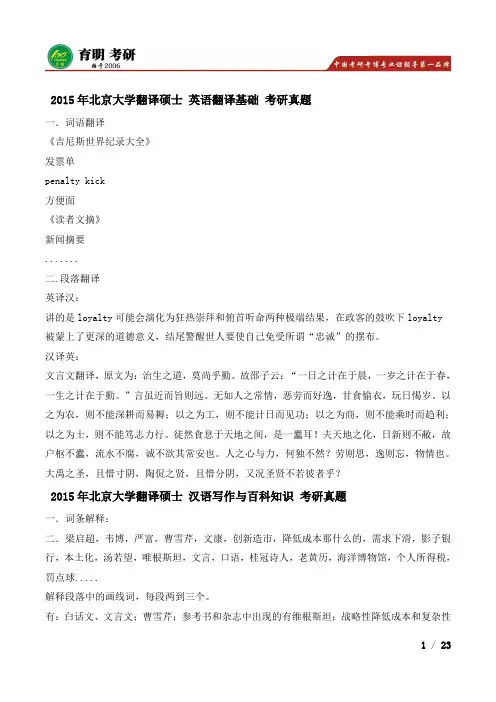
2015年北京大学翻译硕士英语翻译基础考研真题一.词语翻译《吉尼斯世界纪录大全》发票单penalty kick方便面《读者文摘》新闻摘要.......二.段落翻译英译汉:讲的是loyalty可能会演化为狂热崇拜和俯首听命两种极端结果,在政客的鼓吹下loyalty被蒙上了更深的道德意义,结尾警醒世人要使自己免受所谓“忠诚”的摆布。
汉译英:文言文翻译,原文为:治生之道,莫尚乎勤。
故邵子云:“一日之计在于晨,一岁之计在于春,一生之计在于勤。
”言虽近而旨则远。
无如人之常情,恶劳而好逸,甘食愉衣,玩日愒岁。
以之为农,则不能深耕而易耨;以之为工,则不能计日而见功;以之为商,则不能乘时而趋利;以之为士,则不能笃志力行。
徒然食息于天地之间,是一蠹耳!夫天地之化,日新则不敝,故户枢不蠹,流水不腐,诚不欲其常安也。
人之心与力,何独不然?劳则思,逸则忘,物情也。
大禹之圣,且惜寸阴,陶侃之贤,且惜分阴,又况圣贤不若彼者乎?2015年北京大学翻译硕士汉语写作与百科知识考研真题一.词条解释:二.梁启超,韦博,严富,曹雪芹,文康,创新造市,降低成本那什么的,需求下滑,影子银行,本土化,汤若望,唯根斯坦,文言,口语,桂冠诗人,老黄历,海洋博物馆,个人所得税,罚点球.....解释段落中的画线词,每段两到三个。
有:白话文、文言文;曹雪芹;参考书和杂志中出现的有维根斯坦;战略性降低成本和复杂性(《企业文化之路》那一页的三个)、本地化管理等。
应用文写作:北大某教授报销费用的申请。
注意信息完整,用语正式、准确(比如不要总说“你怎么样”、格式正确,可看一下公文写作相关书籍。
大作文:评论“APEC蓝”2017年北京大学翻译硕士考研参考书院校名称报录比推荐参考书备注北京大学1:251-《中式英语之鉴》Joan Pinkham、姜桂华著,2000年,外语教学与研究出版社。
2-《英汉翻译简明教程》庄绎传著,2002年,外语教学与研究出版社。
3-《高级英汉翻译理论与实践》叶子南著,2001年,清华大学出版社。
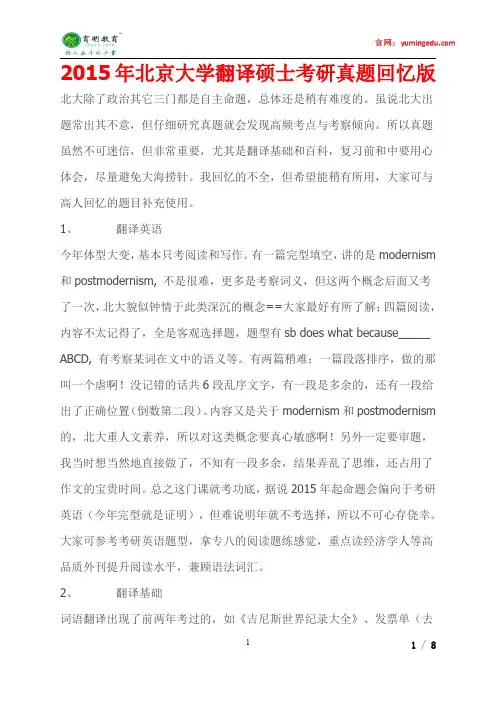
2015年北京大学翻译硕士考研真题回忆版北大除了政治其它三门都是自主命题,总体还是稍有难度的。
虽说北大出题常出其不意,但仔细研究真题就会发现高频考点与考察倾向。
所以真题虽然不可迷信,但非常重要,尤其是翻译基础和百科,复习前和中要用心体会,尽量避免大海捞针。
我回忆的不全,但希望能稍有所用,大家可与高人回忆的题目补充使用。
1、翻译英语今年体型大变,基本只考阅读和写作。
有一篇完型填空,讲的是modernism 和postmodernism,不是很难,更多是考察词义,但这两个概念后面又考了一次,北大貌似钟情于此类深沉的概念==大家最好有所了解;四篇阅读,内容不太记得了,全是客观选择题,题型有sb does what because_____ ABCD,有考察某词在文中的语义等。
有两篇稍难;一篇段落排序,做的那叫一个虐啊!没记错的话共6段乱序文字,有一段是多余的,还有一段给出了正确位置(倒数第二段)。
内容又是关于modernism和postmodernism 的,北大重人文素养,所以对这类概念要真心敏感啊!另外一定要审题,我当时想当然地直接做了,不知有一段多余,结果弄乱了思维,还占用了作文的宝贵时间。
总之这门课就考功底,据说2015年起命题会偏向于考研英语(今年完型就是证明),但难说明年就不考选择,所以不可心存侥幸。
大家可参考考研英语题型,拿专八的阅读题练感觉,重点读经济学人等高品质外刊提升阅读水平,兼顾语法词汇。
2、翻译基础词语翻译出现了前两年考过的,如《吉尼斯世界纪录大全》、发票单(去年考的是invoice,英译汉),好像还有penalty kick,此外有方便面、《读者文摘》、新闻摘要(要注意区分digest、abstract等词),没有特别偏怪的词。
英译汉大家可百度一下美剧常出现的词汇,并不多,但是和北大考的风格很接近,有很多是西方常用的文化意义词汇。
英译汉:稍有难度,讲的是loyalty可能会演化为狂热崇拜和俯首听命两种极端结果,在政客的鼓吹下loyalty被蒙上了更深的道德意义,结尾警醒世人要使自己免受所谓“忠诚”的摆布。
北京大学翻译硕士考研真题--百科知识解析1.1政治1.1.1考研真题及详解1.“我们首先应当确定一切人类生存的第一个前提也就是一切历史的第一个前提,这个前提就是:人们为了能够‘创造历史’,必须能够生活。
但是为了生活,首先就需要衣、食、住以及其他东西。
因此第一个历史活动就是生产满足这些需要的资料,即生产物质生活本身。
”下列最能准确概括这段话含义的是()。
(北航2010翻译硕士)A.物质文明为精神文明提供物质条件B.生产物质生活本身是人类生存的第一个前提C.人类的物质生产决定其精神生产D.生产物质生活本身是人类的第一个历史活动【解析】这段话主要讲的是物质文明的问题。
引号里面的话可概括为:生产物质生活本身是人类生存的第一个前提,也是第一个历史活动,并由此得出结论:物质文明为精神文明提供一定的物质条件”。
BD两项都是对引号中内容的总结,过于片面;C项原文中没有提到。
2.“以民为本”的思想是我国古代政治、哲学的精髓,这对我们树立和落实以人为本的科学发展观颇有启迪。
下列名言中没有蕴含这一思想的是()。
(北航2010翻译硕士)A•安得广厘千万间,大庇天下寒士俱欢颜B•采得百花成蜜后,为谁辛苦为谁甜C.居庙堂之高则忧其民,处江湖之远则忧其君D先天下之忧而忧,后天下乏乐而乐【解析】B项,“采得百花成蜜后,为谁辛苦为谁甜”巧妙地切中了蜜蜂辛劳一生,却不知为谁作嫁的主题,道出了世态炎凉,人情冷暖,因而成为历久不衰、流传至今的佳句。
诗人借蜂喻人,比喻农民的劳动成果被剥夺。
现被世人用于感叹自己的苦心白费、血汗白流。
也有用以赞扬辛勤为民、毫无私心的高尚情操,并无“以民为本”之意。
A项,怎么才能得到千万间宽敞高大的房子,普遍地庇护天下间贫寒的读书人,让他们个个都开颜欢笑(杜甫《茅屋为秋风所破歌》);C项,那些忧国忧民之士,当他在朝廷做官时,心里想的是黎民百姓,而当他流落于民间时,则想着如何为君主效力;D项,在天下人忧之前先忧,在天下人乐之后才乐。
北京大学英语笔译MTI考研信息整理北京大学英语笔译考研参考书、招生人数、历年分数线、报录比、复试信息1.招生人数2015年的北大英语笔译方向计划招生30人,接受推免人数15~20人;实际招生人数为:18人(2人为港澳台学生)接受推免人数:12人;2016年的北大英语笔译方向计划招生30人,接受推免人数15人;实际招生人数为:18人(1人为港澳台学生)接受推免人数:12人;学制:两年北大翻硕学费:2016年:5万/两年;2015年:8万/两年;前几年北大翻硕的学费都比较高,16年进行了调整,降至5万。
2.初试考试科目:1、101思想政治理论(100分)2、211翻译硕士英语(100分)3、357英语翻译基础(150分)4、448汉语写作与百科知识(150分)★★★育明宋老师解析:北大英语MTI只有笔译一个方向,初试除了思想政治理论是全国统一试卷,剩下的三门专业课,都是北大自主出题,出题的整体方向都偏文学性,特别指出的是,北大英语MTI 和日语的MTI的专业课汉语写作与百科知识,考的是同一张试卷,分为基础知识(100分)和专业知识(50分)两部分,满分150分.北京大学2012年翻译硕士MTI真题与答案(回忆版)I.Directions:Translate the following words,abbreviations or terminology into their target language respectively.(30scores;30minutes)1.academy award奥斯卡金像奖2.Animated movie3.Autograph4.Avant garde5.Beatle甲壳虫6.Bermuda Triangle百慕大三角7.Broadway百老汇8.Byzantium拜占庭9.Catholicism天主教10.Civilian平民11.Consumerism消费者保护主义12.Contributor贡献者13.Cubism立体派,立体主义14.East End伦敦东区15.Expo世博会16.未来主义futurism17.《吉尼斯世界记录大全》the Guinness Book of World Records18.头版新闻19.蜜月honeymoon20.犹大之吻a Judas kiss21.垃圾文化22.迷惘的一代The Lost Generation23.手···(忘了)24.人力资源Human Resources25.香格里拉Shangri-La26.碳酸饮料carbonated beverage27.荒诞派戏剧absurd theatre28.特···(忘了)29.中古英语Middle English30.学士学位bachelor’s degreeII.Directions:Translate the following two source texts into their target language respectively.(120scores;120minutes)Text l(关于纸质书、电子书。
北京大学英语翻译硕士(MTI)育明教育孙老师整理,北大考情分析。
一、试卷内容与结构思想政治理论:单项选择题、多项选择题、材料分析题和简答题,共100分。
翻译硕士英语:单项选择题,共30分;阅读2-3篇,共40分;作文一篇;满分100分。
英语翻译基础:词汇翻译(英译汉、汉译英各15个),篇章翻译(英译汉、汉译英各一篇),满分150分。
汉语写作与百科知识:名词解释25个,共50分;小作文(应用文写作)一篇,大作文一篇,满分150分。
思想政治基础:北京大学的政治题采用的是全国统一卷,难度适中,题型较为灵活。
翻译硕士英语:单项选择题的考察点比较基础,重点基本落在容易模糊的语言点上;词汇难度一般,基本涵盖专八词汇,包括GRE词汇的一部分;语法考察较为细致;较为侧重对语义的考察。
英语翻译基础:词汇翻译覆盖面较广,既涉及到时政词汇,又有文学、经贸法律词汇的相对涉猎;篇章翻译文学性较强,近两年来的汉译英均选取了文言文或文学评论篇章,难度较大。
汉语写作与百科知识:名词解释部分,北大比较侧重于文学术语的考察,词汇相对难度较大,可能会出现文言词汇或语句;写作部分,北大比较侧重于对时事热点的考察。
二、试卷结构变化趋势分析一直以来,北京大学的考题难度都比较大,考题较为灵活多变。
翻译硕士英语的难度基本固定,考察点基本落在大家平时会忽略的知识点上,对语感语义的考察较多,比较注重基本功的考察;英语翻译基础的考察面较广,就近三年的真题而言,词汇翻译部分覆盖面较广,从文学到经贸法律均有涉猎,但总体还是稍稍偏重于文学词汇的,篇章翻译文学性较强;汉语写作与百科知识的考察由浅入深,从前几年以考察文学类术语为主到近两年考察语言学术语、翻译术语及文言翻译,作文时事热点性强,较为贴合社会热点话题,要求考生要关注当下时事。
政治【学科概述】不用因为政治纷繁复杂的知识点而担心政治会不过线,只要肯下功夫,60分是很容易达到的。
但对于想考名校的朋友,如果期望考到75分左右的高分,你们就需要仔细做选择题,认真地理解重点了。
北京大学翻译硕士考研真题--百科知识解析1.1政治1.1.1考研真题及详解1.1.2典型题及详解1.下列哪个国家不是联合国常任理事国之一?()A.英国B.法国C.中国D.德国【解析】联合国5大常任理事国包括美国、俄罗斯、中国、法国、英国。
2.香港回归祖国的时间是()。
A.1996.7B.1997.7C.1998.12D.1999.12【解析】1997年7月1日,中华人民共和国恢复对香港行使主权。
3.联合国成立于何年?()A.1944.10B.1945.10C.1946.10D.1950.10【解析】联合国是一个由主权国家组成的国际组织。
1945年10月24日在美国加州旧金山签定生效的《联合国宪章》标志着联合国正式成立。
4.下列机构哪一个不属于联合国的机构?()A.联合国大会B.安理会C.国际法院D•国际奥委会【解析】根据《联合国宪章》第二章第七条规定,联合国设有联合国大会、联合国安全理事会、联合国经济及社会理事会、联合国托管理事会、国际法院和联合国秘书处等6个联合国主要机构。
D项,国际奥委会不属于联合国机构。
5.欧洲国家卢森堡是属于哪一种国体的国家?()A.大公国B.共和国C.联邦体D.酋长国【解析】卢森堡,全称为卢森堡大公国,是现今欧洲大陆仅存的大公国,以大公为国家元首,大公是世袭的,掌握国家最高权力。
6.世界上建立的最早的资产阶级国家是()。
A.英国B.美国C.德国D.荷兰【解析】尼德兰革命是人类历史上第一次成功的资产阶级革命,具有鲜明的民族解放斗争性质,1851年建立了第一个资产阶级共和国——尼德兰共和国(即今荷兰)。
7.中国共产党成立于何时?()A.1920.7B.1921.7C.1922.7D.1949【解析】1921年7月23日-7月31日,中国共产党在上海召开了第一次全国代表大会,大会通过了中国共产党的第一个纲领和决议。
党的一大宣告了中国共产党的正式成立。
8.中华人民共和国国家主席、副主席每届任期多少年?()A.三年B.四年C.五年D.六年【解析】中华人民共和国国家主席、副主席每届任期同全国A民代表大会每届任期相同,均为5年,连续任职不得超过两届。
北京大学翻译硕士考研真题真题解析真题答案考研资料【百天考研冲刺】最后100天需要注意事项:第一,尽快明确重点,然后拼命背诵。
第二,尽快模拟考试,然后找到问题。
第三,尽快调整状态,然后全力冲刺。
Part Three The Period of the English BourgeoisRevolutionI.Choose the right answer.1.The rhyme scheme of Milton’s L’Allkegro and Il Penseroso is_____.A.aabbccbbcB.abbacdccdC.abacdeecD.ababcdcdd2._____,as a declaration of people’s freedom of the press,has been aweapon in the later democratic revolutionary struggles.A.On the Morning of Christ’s NativityusC.Of Reformation in EnglandD.Areopagitica3.____poems can be divided into two categories:the youthful love lyrics andthe later sacred verses.A.John MiltonB.John BunyanC.John DonneD.John Dryden4._____expressed Donne’s own way of describing love.A.Holy SonnetsB.Witchcraft by a PictureC.The Sun RisingD.Death,Be Not Proud5.George Herbert’s______is a well-known shaped poem.A.The AltarB.To His Coy MistressC.To DaffodilsD.Gather Ye Rose Buds While Ye May6.____is the leading figure of Metaphysical poetry.A.John DonneB.George HerbertC.Andre MarvellD.Henry Vaughan7.Which of the following is not a Metaphysical poet?A.Richard CrashawB.Henry VaughanC.Andrew MarvellD.Robert Burton8.____is a prose poem on death and immortality.A.The Anatomy of MelancholyB.Religio MeciciC.Holy DyingD.Urn-Burial9.Izaak Walton’s____is a delightful description of the English countrysideand the simple and kind people.A.The Compleat AnglerB.Holy LivingC.To His Coy MistressD.To Daffadils10.Who is the greatest figure of the Cavalier poetry?A.John SucklingB.Richard LovelaceC.Robert HerrickD.John Dryden11.____was the forerunner of the English classical school of literature in the19th century.A.John DrydenB.Richard SteeleC.Joseph AddisonD.Alexander PopeKey to the multiple choices:1-5CDCBA6-11ADDAADII.Fill in the blanks.1.In the field of prose writing of the Puritan Age,_______occupies the mostimportant place.2.The Pilgrim’s Progress is one of the most popular pieces of Christian writingproduced during the_____Age.3.______gives a vivid and satirical picture of Vanity Fair which is the symbolof London at the time of Restoration.4._____masterpiece,The Pilgrim’s Progress,is an allegory,a narrative inwhich general concepts such as sins,despair,and faith are represented as people or as aspects of the natural world.5._____is the most excellent representative of English classicism in theRestoration period.6.In English literature,the Restoration period is traditionally called“Age of_____.7.In political affairs,____was quite changeable in attitude.8.In his“An Essay of Dramatic Poesy”,____showed his famous appreciationof Shakespeare.9.Dryden wrote about27plays.The famous one is_______,a tragedydealing with the same story as Shakespeare’s Antony and Cleopatra.10.The main literary achievements of the17th century lies in the poetry of JohnMilton,in the prose writing of John Bunyan,and in the plays and literary criticism of______.11.Paradise Lost is one of Milton’s______.12.Satan is the hero in Milton’s masterpiece__________.13.Paradise Lost took its material from______.14.The works of the Metaphysical poets are characterized,generally speaking,by_____in content and fantasticality in form.15._______was the forerunner of the English classical school of literature inthe18th century.16.Adam and Eve in Paradise Lost embody Milton’s belief in the powers of_____.17.The Pilgrim’s Progress is a religious allegory and_____is another writingfeature.18.In the second half of the17th century we may hear the voices of the privatecitizens by letters and_____.Key to the blanks:1.(John Bunyan)2.(Puritan)3.(The Pilgrim’s Progress)4.(John Bunyan’s)5.(John Dryden)6.(Dryden)7.(John Dryden)8.(John Dryden)9.(All for Love)10.(John Dryden)11.(epics)12.(Paradise Lost)13.(mysticism)14.(the Bible)15.(Dryden)16.(man)17.(symbolism)18.(diaries)III.Say true or false.1.The major parliamentary clashes of the early17th century were over landownership.2.After the victory of the English Revolution,the movement of the Diggersbroke out.The leader of this revolt is Wat Tyler.3.With the establishment of the bourgeois dictatorship,Charles II became theProtector of the English Commonwealth.4.The spirit of unity and the feeling of patriotism ended with the reign ofJames I,and England was then convulsed(shook,quivered)with theconflict between the two antagonistic camps,the Royalists and the Puritans.5.In1644,James I was sentenced to death and Cromwell became the leaderof the country.6.English literature of the17th century witnessed a flourish on the whole.7.The Revolution Period produced one of the most important poets in Englishliterature,William Shakespeare.8.The Revolution Period is also called Age of Milton because it produced agreat poet whole name is William Milton.9.The main literary form in literature of Revolution Period is drama.10.Among the English poets during the Revolution Period,John Donne was thegreatest one.11.John Milton towers over his age as Byron towers over the Elizabethan Age,and as Chaucer towers over the Medieval Period.12.On his first wife’s death,Milton wrote his only love poem,a sonnet,on HisDeceased Wife.13.The greatest epic produced by Milton,Paradise Lose,is written in heroiccouplets.14.The poem of Samson Agonistes was“to justify the ways of God to man”,i.e.to advocate submission to the Almighty.15.It has been noticed by many critics that the picture of Satan surrounded byhis angels who never think of expressing any opinions of their own,resembles the court of an absolute monarch.16.Izaak Walton’s The Compleat Angler becomes a“Piscatorial classic”.17.Thomas Browne’s Religia Medici is a collection of opinions on a vast numberof subjects more or less connected with religion.Key to True/False statements:1.F(ownership:monopolies)2.F(Wat Tyler:Gerald Winstanley)3.F(Charles II:Oliver Cromwell)4.F(Donne:Milton)5.F(James I:Charles I)6.F(flourish:decline)7.T(William Shakespeare)8.F(William:John)9.F(drama:poetry)10.F(James I:Elizabeth I)11.F(Byron:Shakespeare)12.F(first:second)13.F(heroic couplets:blank verse)14.F(Satan:God)15.F(Samson Agonistes:ParadiseLost)16.T17.TIV.Questions1.What are the writing features of The Pilgrim’s Progress?ment on the image of Satan.ment on Samson.一、每日作息表6:30—7:30起床洗漱吃早餐(营养早餐,肉蛋奶谷物必备)7:30—8:00背诵考研英语单词(考试不停,单词不止。